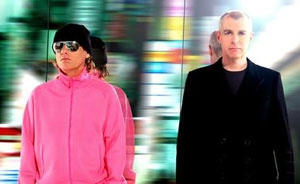
The Pet Shop Boys released their latest album, Fundamental (along with the special edition two-disc set Fundamentalism), three weeks ago in most of the world outside of the United States, where it briefly rose to the top of the European charts. The US release has seemingly been delayed by the question of distribution. Rhino will release the album in the US this coming week, both on compact disc and digitally via ITunes (it is now available for download on ITunes). The fact that the Pet Shop Boys are one of the world’s most popular acts but relatively unknown or barely remembered here only signifies on the strange cultural self-involvement of the US market. If your average American were to remember anything about PSB, they would most likely chalk them up to an eighties one-hit wonder, for their song "West End Girls," which dominated radio airplay in and around 1985: a distant memory, slightly campy and certainly not au courant, in short, a joke without a punchline.

However, for many North American gay men, the latest release from PSB is a moment of celebration. For arguably PSB are the sirens of developed world pop culture gayness, more meaningful than Will and Grace and deeper than Dan Savage (although admitedly that wouldn't take much), their songs over the years have traced a cartography of gayness that is a rich vein of allusion and metaphor, covering the multifaceted nature of contemporary gay identity: relationships, love, sex, tricking, HIV, homophobia, fame, shame, and illusion. In honour of their latest release, which Skanque Huore generously got me on her recent trip to the UK, I thought I would share some thoughts on why I think PSB are one of the brightest stars in the gay cultural firmament, not only in my annoyance at the delay in a US release (which I would typify as American cultural narcissism), but also as a recognition of their importance in my own development as a gay man, and the manner in which I imagine my world, through the effect of their music.
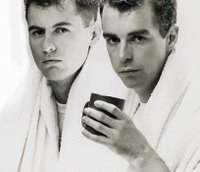
Emerging with similar gay pop scenesters like Soft Cell and Bronski Beat in the early eighties, one of the most interesting things about PSB is their longevity. Neil Tenant and Chris Lowe, the two gay men who compose the Pet Shop Boys, have been making music together for almost 25 years. Originally thought of as “gay lite,” due to their coyness regarding their sexuality in comparison to the openly gay songs of Soft Cell (have a listen to "Bedsitter") and Bronski Beat ("Small Town Boy," natch), they have continued to make music in ways that have, over the years, become openly gay and in many instances quite thoughtful (NB: As have Marc Almond and Jimmy Somerville, former front men of Soft Cell and Bronski Beat respectively; Boy George, the other [more] prominent gay/gender-queer figure from this time, is a whole category unto himself).
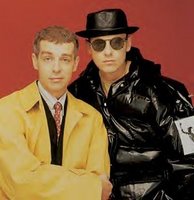
New Wave music (roughly 1980-1987), in general, was a gender-bending phenomenon that challenged the male-centred rock music that had dominated the airwaves of the seventies. Influenced by punk, Glamrock, emerging electronica, and disco, New Wave embraced the concept of spectacle in a way quite different from, say, Rush or Journey. Flouncy shirts, make-up, eyeliner, girls’ shoes, and big hair typified the scene, which spoke to particular listening communities (teenaged girls, gay boys, sensitive str8 boys) that, in some ways, hadn’t been spoken to in a few years (since David Bowie). The primary vehicle for this emergent spectacle was of course, the innovation and mass diffusion of the music video, and it is no accident that New Wave and the birth of MTV occurred at roughly the same time. At the top of this heap of glitter and eyeliner and trash would be Duran Duran, followed by other no doubt familiar names, such as The Cure, Culture Club, the Eurythmics, Tears for Fears, Depeche Mode, Spandau Ballet, Joy Division/New Order, Dead or Alive, the Thompson Twins, Ultravox, The Human League, A Flock of Seagulls, Thomas Dolby, and Howard Jones.
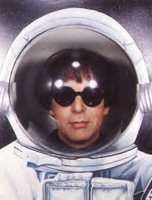
All of these bands and performers featured elements of gender-bending performance, some decidedly explicit, such as Boy George of Culture Club, Annie Lenox of the Eurythmics, and Pete Burns of Dead or Alive. Looking like aliens in thick eyeliner and shocking hair colours, they pranced around in glamourous locations to their heavily electronic music, seeming new and fresh and powerful. To gay boys listening far from England, they offered a vision of possible and plausible and sophisticated sexualities that were incredibly different from the array of choices we were being given at home, in the schoolyard, or the gymnasium. And while most of us didn’t go out and start putting on eyeliner or wearing skirts or dying our hair (although some of us indeed did), the images cleared a space for us to begin to construct an alternative vision of ourselves, not as fathers or football stars or preppy boys or “str8 looking, str8 acting,” but as explicitly, outrageously queer.
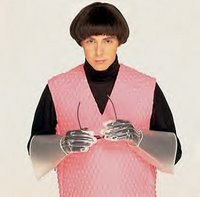
The Pet Shop Boys came to this game later, and in a less pronounced way. But elements of their development gesture towards why they remain vital in a way that these other bands, many of who still make music, haven’t. One was their uncanny ability to project ambiguity in their lyrics, so that heterosexuals and LGBT folks could find a niche. Another was their profound and growing investment in production and visuality. Their music videos were never glam productions in tropical locales like Duran Duran, but more like independent films, esoteric and intellectual and difficult. They seem to have taken Mulvey to heart. This would shift and change over the years, but a sort of outrageous intellectual visuality typifies their career, along with a significant interest in dance trends and electronica both in Europe and North America, all of which speaks to certain sophisticated urban gay tastes and habits.
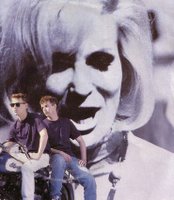
I don’t specifically remember them coming out, but by the time of their 1987 single “What Have I Done to Deserve This?” with the fabulous Dusty Springfield, it was pretty obvious to anyone paying attention that they were, to put it colloquially, Big Ol’ Fags! Firstly, because Dusty was such an LGBT icon in the UK (and to a lesser extent in the US), their collaboration with her was a signal to the cognoscenti. I myself had listened to my mother’s old Dusty albums as a tween and teen, along with her diva collection of Chaka Khan and Rufus, Angela Bofill, Roberta Flack, the Supremes, all of who spoke to me through their agency and visual glamour. Who knew that they were wigs on the tops of those heads? I did, in a big way. PSB continued this gay collaborative trend with Liza Minnelli in 1989, producing Results, which is a surprisingly good album, at least for Liza (not a big fan here; I know, turn in the Gay Card now!).
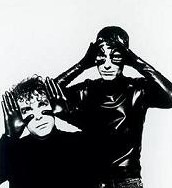
It was around this time (the late 1980s and continuing into the early nineties) that their lyrics, especially on their B-sides, started to get more explicitly gay. Some of these songs, collected on their anthology Alternative (1995), clearly speak to gay life in powerful ways: cruising (“A Man Could Get Arrested,” “Was That Was It Was?”), the closet and coming out (“Jack the Lad,” “Hey, Headmaster,” “Bet She’s Not Your Girlfriend,” “Your Funny Uncle,” “Some Speculation”), romance and love and breaking up (“You Know Where You Went Wrong,” “A New Life,” “Miserablism”) and gay hedonism (“Shameless,” Decadence”). The lyrical voice in these songs is wry, critical, telling. The fact that they are B-sides also indicates that this voice is semi-private, meant for true listeners and fans, not radio. Their bigger hits of this time period, after the US/UK success of “What Have I Done to Deserve This?” (“It’s a Sin,” “It’s Alright,” “Being Boring,” “Left to My Own Devices,” “DJ Culture”) are either very pop or pointedly political (in particular “It’s a Sin,” “It’s Alright,” and “DJ Culture,” a criticism of the first Gulf War akin to Baudrillard’s idea of virtual war).
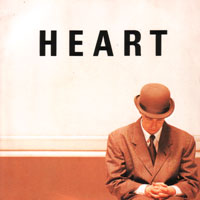
The disappearance of PSB from the US charts parallels their openly gay breakthrough, starting with Behaviour (1990) (with the excellent “Jealousy” and “This Must Be the Place I Waited Years to Leave”) but really reaching full fruition with Very (1993), which for all intents and purposes is their first explicitly gay album. I remember the incredible excitement that greeted the release of the album, because it spoke to immediate concerns and realities of gay life that were, at the time, felt viscerally. In particular, the track “Dreaming of the Queen” addressed the nadir of the HIV crisis in the community, the feelings of helplessness and tragedy that many of us felt in the years before HAART therapy, (Highly Active Anti-Retroviral Therapy, aka the AIDS “cocktail”). The lyrics of the song are still haunting:
Dreaming of the Queen
visiting for tea
You and her and I
and Lady Di
The Queen said: 'I'm aghast
Love never seems to last
however hard you try'
And Di replied that
'There are no more lovers left alive
No one has survived
so there are no more lovers left alive
and that's why love has died
Yes, it's true
Look, it's happened to me and you'
[…]
I woke up in a sweat
desolate
For there were no more lovers left alive
No one had survived
so there were no more lovers left alive
and that's why love had died
Yes, it's true
Look, it's happened to me and you
Here PSB is playing off a study at the time that demonstrated that many Britons regularly dreamed of Queen Elizabeth, but used this fact to great dramatic effect, by collapsing the Queen of England into the figure of the gay Queen, as well as deploying the royal romance scandals of the period ("the death of love") to represent the actual deaths of thousands of gay men across the world from HIV disease, and the effect of this crisis on the gay mind: desolation. Other tracks on this album, especially “I Wouldn’t Normally Do This Kind of Thing,” “Liberation,” and “Young Offender,” openly speak of gay life, love and desire, but for me, “Dreaming of the Queen” remains the signature song of the album and the moment.

By the time of the release of Bilingual (1996), HAART therapy had demonstrably changed the equation of HIV disease in the gay community (for those with the financial wherewithal or adequate insurance), and their songs here begin to address the recovery of gay life post-HIV crisis nadir. They address this interstitial resolution by exploring survival, a theme present in the work of gay literature as well (I am thinking here in particular of the work of Andrew Holleran and Ethan Mordden). One of the remarkable things about PSB is that their music covers not only the good but also the bad that confronts the gay community, in a genre (popular music) not known for its political qualities, as well as the specifically gay aspects of socio-cultural politics and experience. Their song “The Survivors” ponders this question of survivance in ways similar to other voices in gay cultural production:
[…]
(The survivors)
Our heads bowed
(The survivors)
At memorials
for other faces in the crowd
Teachers and artists
(it's never easy)
and Saturday girls
in suits or sequins
(it's never easy)
or twinsets and pearls
[…]
Many roads will run through many lives
but somewhere we'll survive
What I like about this is that PSB connect the communal (“other faces in the crowd”) to the individual, acknowledging the essentially collective nature of the HIV crisis for gay men, as well as expressing a profound investment in survival, in making it through, in a recognition that not only is survival possible but necessary.

Fundamentalism is an interesting disc that I have been listening too pretty much non-stop since Skanque Huore’s package arrived (along with a Clarins Men roll-on from Heathrow's duty-free shop, so delicious). I would say I like half of it so far, especially the songs ("Minimal," "The Sodom and Gomorrah Show,” “Integral”) that speak to their roots in electronic dance. In particular, “Minimal,” apparently the next single following “I’m With Stupid” (a pointed critique of the relationship between Tony Blair and George Bush), is an excellent primer in sophisticated electronica, more New Order than New Order, and highly listenable. Continuing their focus on explicit aspects of gay life, “Luna Park” is a haunting testament to the gay cruising grounds of parks and public spaces on the eve of HIV, and their remix of their classic “In Private,” originally covered by Dusty (the remix by Shep Pettibone is magnificent, and as hard to find as political coverage for pulling out of Iraq), is here brilliantly redone with Elton John.

As I listen to this new album and their oeuvre, all handily digitised on my Mac, I reflect on the fact that Neil Tenant’s voice is like a map of my life, as recognisable as my own, and therefore one of those sonic triggers that both takes one back and forward simultaneously. This, of course, speaks to the power of music in general, but in the example of the Pet Shop Boys, their career trajectory also matches my own as a developing and maturing gay man, and it makes me glad and feeling lucky that we gay men have a voice, however unappreciated on this side of the pond, that speaks to our socio-cultural condition in our own language, from a position of innovation, creativity, vitality, and above all, survivance.



5 comments:
Hail, Amazon Sister! Though I have an appreciation for PSB (natch! to use an Osoism), they were not as critical to my queer-music development as they might have been. For me, the older music of Queen and the newer wave of Erasure informed my queer mind and desires much more. Of course, Queen coyly played with their sexuality, but never quite came out enough. Sigh
Nice bit on the history of the PSB. I grew up in the West End of London and remember well when 'West End Girls' hit the airwaves. We all thought it was hilarious, whilst the rude boy hold-outs thought it was some treatise on class. And there was something about the West End girls of the day. Oh, yes.
Just curious: why the reference to Echo & The Bunnymen?
Cheers
Hey App Crit,
The reference to Echo and the Bunnymen is both an insider's homage to another influential 80s band that I love(d), as well as speaks to the fact that I always liked that album title, both for its funny socialist pretensions along with the fact that indeed our favourite music we do learn and sing, long and lustily, as odes to our own conditions, and pop music can become, in so many ways, our idiosyncratic ballads of identity and tribe.
The imagination of the West End Girl in 1980s New Wave Los Angeles, as you can imagine, was no doubt remarkably different from the reality, and while it would be many years before I would experience the real London and her social subcultures, it did make a place in my mind for the city as a centre in which I belonged, strangely, as a member of the global anglophone family, in the end probably a tendentious concept but one also marked, remarkably enough, on Bush House.
In the end, however, the London of my imagination never could live up to the hard-bitten reality of the actual city, and whenever I am in London I always find myself dreaming of the lush francophone cities that feel so close: Paris, Brussels, Geneva, and that, for whatever reason (familiarity, creature comforts, friendship networks, memory, park benches) seem much more welcoming that big, booming, loud, brash London. Just call me Jane Birkin (minus the breathy little girl voice, oh, and the lecherous Serge Gainsbourg).
OR
As a non-gay Average American I have to say that West End.... blah blah blah.. had nothing on Opportunities (Let's Make Lots of Money) which is the finest PSB song evar! I'm not sure I ever saw the distinction you seem to be making between the pre and post "openly gay breakthrough" since they were gay as Freddie from day one. I suppose the formal announcement is all the rage, nowadays.
I also suppose I will have to fire up Limewire. ;-)
As to Marc Almond? Gay? More like anything-sexual. My parents lived in Palo Alto and hosted a record party (its where I got my Iggy and New York Dolls vinyl!) for Marc Almond. Who got absolutely legless and masturbated our Keeshond on the kitchen floor.
A moment which will forever live in my rock n' roll mind.
NOTE: As a callow youth at that time is it possible there is a name-alike? The guy I remember was gay, but also rippingly drunk and far more chunky and dissolute looking than Almond is today.....
Oso,
Gotcha. I like E&B, too.
And I know what you mean about the centre of the global anglophone family. That's about the only draw I have to London. If I were English, I might feel differently about it. It's louder than ever and not quite as 'EU' as I hoped it would be by now. I prefer Paris, as well, or Zurich or Milan or Copenhagen or Barcelona or even Athens. Anything but London.
Love the Jane Birkin reference. As bad a singer as she was, Bardot was just ghastly.
Cheers
Post a Comment